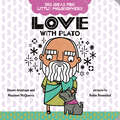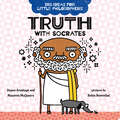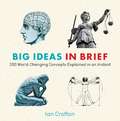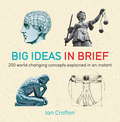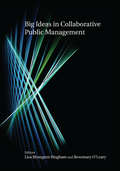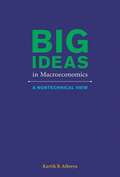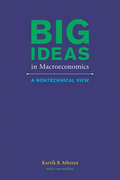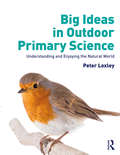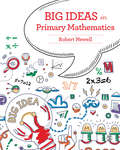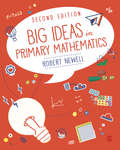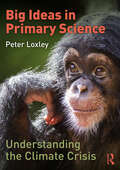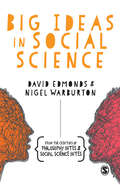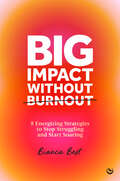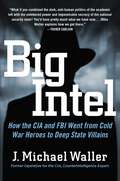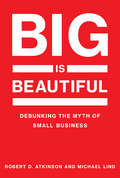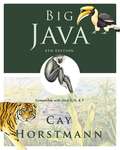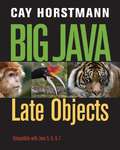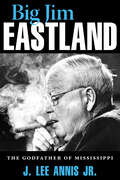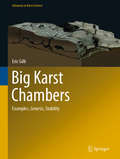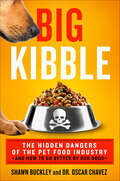- Table View
- List View
Big Ideas for Little Philosophers: Love with Plato (Big Ideas for Little Philosophers #6)
by Duane Armitage Maureen McQuerryExplore the importance of love with the youngest readers in a wonderfully accessible way.Even little children have big questions about life. Plato believed showing and receiving love makes us wise, and Love with Plato brings his philosophy to the youngest thinkers. Asking young readers what being loved feels like to them and how they can show others love prompts questions about how we treat one another and ourselves. This book will lead to inspiring conversations about loving people for what is on the inside, and helping others do the same.Look for all six Big Ideas for Little Philosophers board books: Equality with Simone de Beauvoir, Happiness with Aristotle,Imagination with René Descartes, Kindness with Confucius, Love with Plato, and Truth with Socrates.
Big Ideas for Little Philosophers: Truth with Socrates (Big Ideas for Little Philosophers #4)
by Duane Armitage Maureen McQuerryExplore the importance of truth with the youngest readers in a wonderfully accessible way.Even little children have big questions about life. Socrates believed being truthful and asking questions about the world can make us wise, and Truth with Socrates brings his philosophy to the youngest thinkers. From the importance of being honest even if it's hard or makes you scared to always asking questions to understand more about everything around you, this book will lead to inspiring conversations about human dynamics between people of all ages.Look for all six Big Ideas for Little Philosophers board books: Equality with Simone de Beauvoir, Truth with Socrates, Happiness with Aristotle, Imagination with René Descartes, Kindness with Confucius, Love with Plato, and Truth with Socrates.
Big Ideas for Small Mathematicians: Kids Discovering the Beauty of Math with 22 Ready-to-Go Activities
by Ann KajanderIntroducing sophisticated mathematical ideas like fractals and infinity, these hands-on activity books present concepts to children using interactive and comprehensible methods. With intriguing projects that cover a wide range of math content and skills, these are ideal resources for elementary school mathematics enrichment programs, regular classroom instruction, and home-school programs. Reproducible activity sheets lead students through a process of engaged inquiry with plenty of helpful tips along the way. A list of useful terms specific to each activity encourages teachers and parents to introduce students to the vocabulary of math. Projects in this first of the two Big Ideas books include "Straw Structures," where children get hands-on experience with measurement and 3-D visualization; "Kaleidoscopes," in which students use geometry to build a mathematical toy; and "Crawling Around the Möbius Strip," where kids build a physical example of infinity.
Big Ideas in Brief
by Ian CroftonBig Ideas in Brief provides an accessible and easily understood tour of 200 key concepts that really matter. The ideas covered come from a wide range of subjects-Philosophy, Religion, Politics, Economics, Sociology, Anthropology, Psychology, the Arts, and Science.A series of short and lively articles comprising a maximum of 200 words, accompanied by 100 illustrations, introduces a host of diverse topics, from Existentialism to Expressionism, from Consciousness to Constitutionalism, from Feminism to Free Trade, from Class to Cognitive Theory, from Reincarnation to Relativity-all explained simply and clearly.From the Trade Paperback edition.
Big Ideas in Brief: 200 World-Changing Concepts Explained In An Instant
by Ian CroftonBig Ideas in Brief provides an accessible and easily understood tour of 200 key concepts that really matter. The ideas covered come from a wide range of subjects - Philosophy, Religion, Science, Politics, Economics, Sociology, Anthropology, Psychology and the Arts. A series of short and lively articles accompanied by 100 illustrations introduce a host of diverse topics, all explained simply and clearly.
Big Ideas in Brief: 200 World-Changing Concepts Explained In An Instant (IN MINUTES)
by Ian CroftonBig Ideas in Brief provides an accessible and easily understood tour of 200 key concepts that really matter. The ideas covered come from a wide range of subjects - Philosophy, Religion, Science, Politics, Economics, Sociology, Anthropology, Psychology and the Arts. A series of short and lively articles accompanied by 100 illustrations introduce a host of diverse topics, all explained simply and clearly.
Big Ideas in Collaborative Public Management
by Rosemary O'Leary Lisa Blomgren BinghamThe world of public management is changing dramatically, fueled by technological innovations such as the Internet, globalism that permits us to outsource functions anywhere in the world, new ideas from network theory, and more. Public managers no longer are unitary leaders of unitary organizations - instead, they often find themselves convening, negotiating, mediating, and collaborating across borders."Big Ideas in Collaborative Public Management" brings together a rich variety of big picture perspectives on collaborative public management. The chapters are all original and written by distinguished experts. Designed for practical application, they range from examinations of under what conditions collaborative public management occurs to what it means to be a collaborative leader.The contributors address tough issues such as legitimacy building in networks, and discuss ways to engage citizens in collaboration. They examine the design of collaborative networks and the outcomes of collaboration. Detailed introductory and concluding chapters by the editors summarize and critique the chapters, and frame them as a reflection of the state of collaborative public management today.
Big Ideas in Macroeconomics
by Kartik B. AthreyaMacroeconomists have been caricatured either as credulous savants in love with the beauty of their mathematical models or as free-market fundamentalists who admit no doubt as to the market's wisdom. In this book, Kartik Athreya draws a truer picture, offering a nontechnical description of prominent ideas and models in macroeconomics, arguing for their value as interpretive tools as well as their policy relevance. Athreya deliberately leaves out the technical machinery, providing students new to modern macroeconomics as well as readers with no formal training in economics or mathematics -- including economic writers and policymakers -- with an essential guide to the sometimes abstract ideas that drive macroeconomists' research and practical policy advice.Athreya describes the main approach to macroeconomic model construction, the foundational Walrasian general equilibrium framework, and its modern version, the Arrow-Debreu-McKenzie (ADM) model. He then explains the reasons for the relevance of this model for interpreting real-world outcomes, and lays out the so-called Fundamental Theorems of Welfare Economics. In the heart of the book, Athreya shows how the Walrasian approach shapes and unifies much of modern macroeconomics. He details models central to ongoing macroeconomic analyses: the neoclassical and stochastic growth models, the standard incomplete-markets model, the overlapping-generations model, and the standard search model. Athreya's accessible primer traces the links between the views and policy advice of modern macroeconomists and their shared theoretical approach.
Big Ideas in Macroeconomics: A Nontechnical View (The\mit Press Ser.)
by Kartik B. AthreyaAn accessible description of modern macroeconomics, and a defense of its policy relevance.Macroeconomists have been caricatured either as credulous savants in love with the beauty of their mathematical models or as free-market fundamentalists who admit no doubt as to the market's wisdom. In this book, Kartik Athreya draws a truer picture, offering a nontechnical description of prominent ideas and models in macroeconomics, and arguing for their value as interpretive tools as well as their policy relevance. Athreya deliberately leaves out the technical machinery, providing an essential guide to the sometimes abstract ideas that drive macroeconomists' research and practical policy advice.Athreya describes the main approach to macroeconomic model construction, the foundational Walrasian general-equilibrium framework, and its modern version, the Arrow-Debreu-McKenzie (ADM) model. In the heart of the book, Athreya shows how the Walrasian approach shapes and unifies much of modern macroeconomics. He details models central to ongoing macroeconomic analyses: the neoclassical and stochastic growth models, the standard incomplete-markets model, the overlapping-generations model, and the standard search model. Athreya's accessible primer traces the links between the views and policy advice of modern macroeconomists and their shared theoretical approach.
Big Ideas in Outdoor Primary Science: Understanding and Enjoying the Natural World
by Peter LoxleyBig Ideas in Outdoor Primary Science takes a fresh approach to learning science in outdoor contexts. It combines new thinking in science teaching using big ideas, with our growing need to look after our planet, and encourages children to learn from what scientists have to say about issues which will impact their lives today and in the future. The book offers primary teachers the subject and pedagogical knowledge, as well as the confidence they need, to integrate the seeds of big ideas into their curriculum. To this end, it provides models of good practice which exemplify how primary-aged children can work towards understanding some of science’s big ideas and engage with important issues related to wildlife conservation. The easy-to-use book covers topics such as: Interdependence Adaptation Inheritance Following in Darwin’s footsteps Protecting ecosystems Full of ideas for outside learning, this book is a comprehensive, valuable and essential resource for all teachers of primary science.
Big Ideas in Primary Mathematics
by Robert NewellLightbulb moments for your and you pupils This book explores the 'big ideas' in maths to help trainee teachers confidently teach the curriculum in a way that engages children and focuses on understanding, rather than memory, for those lightbulb moments. Covering the major concepts in simple terms, whilst carefully linking to the National Curriculum, it shows how they can be used to enable learning and support mathematical mastery. A focus on explaining misconceptions and errors will strengthen trainees and teachers own mathematical subject knowledge, while also giving them the confidence to deepen the understanding of the children they teach. Key topics include: · Problem-solving, reasoning and developing fluency in maths · Place value and counting systems · Measuring money, time, and weight · Geometry, and understanding space and shape · Fractions and statistics for the primary classroom This is essential reading for anyone studying primary mathematics on initial teacher education courses, including undergraduate (BEd, BA with QTS) and postgraduate (PGCE, PGDE, School Direct, SCITT) routes, and also NQTs. Robert Newell is a tutor in primary education at the UCL Institute of Education, London.
Big Ideas in Primary Mathematics
by Robert NewellLightbulb moments for you and your pupils This book explores the ‘big ideas’ in maths to help trainee teachers confidently teach the curriculum in a way that engages children and focuses on understanding, rather than memory, for those lightbulb moments. Covering the major concepts in simple terms, whilst carefully linking to the National Curriculum, it shows how they can be used to enable learning and support mathematical mastery. A focus on explaining misconceptions and errors will strengthen trainees and teachers own mathematical subject knowledge, while also giving them the confidence to deepen their understanding of the children they teach. Key topics include: Problem-solving, reasoning and developing fluency in maths Place value and counting systems Measuring money, time and weight Geometry, and understanding space and shape Fractions and statistics for the primary classroom This is essential reading for anyone studying primary mathematics on initial teacher education courses, including undergraduate (BEd, BA with QTS) and postgraduate (PGCE, PGDE, School Direct, SCITT) routes, and also NQTs. Robert Newell is a tutor in primary education at the UCL Institute of Education, London.
Big Ideas in Primary Mathematics
by Robert NewellThis book explains ‘big ideas’ in mathematics in simple terms supported by classroom examples to show how they can be applied in primary schools to enable learning. Carefully linked to the National Curriculum, it covers all the major concepts so you can develop your own mathematical subject knowledge and to give you the confidence to deepen your understanding of the children you teach. This second edition includes: · A new ‘links with mastery’ feature showing how to teach with mastery in mind · A new glossary of key terms · New big ideas and activities throughout
Big Ideas in Primary Mathematics
by Robert NewellThis book explains ‘big ideas’ in mathematics in simple terms supported by classroom examples to show how they can be applied in primary schools to enable learning. Carefully linked to the National Curriculum, it covers all the major concepts so you can develop your own mathematical subject knowledge and to give you the confidence to deepen your understanding of the children you teach. This second edition includes: · A new ‘links with mastery’ feature showing how to teach with mastery in mind · A new glossary of key terms · New big ideas and activities throughout
Big Ideas in Primary Science: Understanding the Climate Crisis
by Peter LoxleyBig Ideas in Primary Science: Understanding the Climate Crisis takes a fresh approach to learning the science of climate change. It combines new thinking in science teaching using big ideas, with our growing need to look after our planet, and encourages children to learn from what scientists have to say about issues that will impact their lives today and in the future. The book offers primary teachers the subject and pedagogical knowledge, as well as the confidence they need, to integrate the seeds of big ideas into their curriculum. It provides models of good practice which exemplify how primary-aged children can work towards understanding some of science’s big ideas and engage with important issues related to climate change. There are also opportunities for children to develop skills and understanding from other curriculum areas, such as geography, design technology, and art. The easy-to-use book covers topics such as: Weather Climate Climate change Impact of the climate crisis on our lives Impact of the climate crisis on wildlife The world we must create Taking climate action By making the ideas their own, children can develop informed ways of thinking about issues related to climate change and feel empowered to act in ways which can make a difference. Full of ideas about the climate crisis, Big Ideas in Primary Science is a comprehensive, valuable, and essential resource for all teachers of primary science.
Big Ideas in Social Science
by David Edmonds Nigel WarburtonAre human beings less violent than before? Why do we adopt certain moral and political judgements? Why is the gap between rich and poor getting bigger? How do we decide which criminal policies are effective? What is the Population Challenge for the 21st Century? What is social science? In Big Ideas in Social Science, David Edmonds and Nigel Warburton put these and more of our society’s burning questions to 18 of the world’s leading social scientists including Steven Pinker, Ann Oakley, Lawrence Sherman, Kate Pickett, Robert J. Shiller and Doreen Massey. The result is a collection of thought-provoking discussions that span the fields of sociology, politics, economics, criminology, geography and many more.From the people who brought us the Philosophy Bites series, Big Ideas in Social Science is a fascinating and accessible introduction to the key ideas and findings of the social sciences. The interviews for this book are based on a series of podcasts, Social Science Bites, sponsored by SAGE. Social Science Bites was inspired by the popular Philosophy Bites podcast (www.philosophybites.com), which was founded by David and Nigel in 2007 and has so far had 26 million downloads. Philosophy Bites has spawned three books, Philosophy Bites, Philosophy Bites Back and Philosophy Bites Again.
Big Ideas in Social Science
by David Edmonds Nigel WarburtonAre human beings less violent than before? Why do we adopt certain moral and political judgements? Why is the gap between rich and poor getting bigger? How do we decide which criminal policies are effective? What is the Population Challenge for the 21st Century? What is social science? In Big Ideas in Social Science, David Edmonds and Nigel Warburton put these and more of our society's burning questions to 18 of the world's leading social scientists including Steven Pinker, Ann Oakley, Lawrence Sherman, Kate Pickett, Robert J. Shiller and Doreen Massey. The result is a collection of thought-provoking discussions that span the fields of sociology, politics, economics, criminology, geography and many more.From the people who brought us the Philosophy Bites series, Big Ideas in Social Science is a fascinating and accessible introduction to the key ideas and findings of the social sciences. The interviews for this book are based on a series of podcasts, Social Science Bites, sponsored by SAGE. Social Science Bites was inspired by the popular Philosophy Bites podcast (www.philosophybites.com), which was founded by David and Nigel in 2007 and has so far had 26 million downloads. Philosophy Bites has spawned three books, Philosophy Bites, Philosophy Bites Back and Philosophy Bites Again.
Big Impact Without Burnout: 8 Energizing Strategies to Stop Struggling and Start Soaring
by Bianca BestGlobal business leader and single mother of 4, Bianca Best, reveals the 8 powerful and transformative strategies for ambitious women to achieve success with integrity and joy. This is a plan for reaching for the stars and seizing them without burning out, through inner balance and magnificent outer shine.Are you craving more time and energy?Is stress taking its toll on your productivity?Do your ambitions feel increasingly hard to achieve?You are not alone. Too many brilliant women are exhausted and dimming their lights unnecessarily. This book is your powerful solution and inspiring path to achieving your dreams with grace, joy and integrity.Bianca Best is an award-winning executive, coach, thought leader and mother of four, who has learned how to succeed without compromising body, mind or soul. After years of burnout, she mastered how to blend ambition with wellbeing. And then a funny thing happened, her impact and happiness soared! This is her practical, proven and invigorating roadmap: just 8 essential strategies to holistically shift from stress and struggle to empowered rising and achieving.With graceful productivity as your superpower, you&’ll find your inner balance then unleash your magnificent outer shine, taking your boldest work into the world, building influence and respect, maximizing your income and value, all while feeling purposeful, peaceful and energized.
Big Intel: How the CIA and FBI Went from Cold War Heroes to Deep State Villains
by J. Michael WallerBig Intel recounts the dramatic story of the rise and Cold War heroics of the CIA and the American intelligence apparatus followed by its unfortunate slide into Marxist-influenced Deep State dysfunction as BIG INTEL became BAD INTEL.How the Left Subverted the CIA and FBI Once upon a time, the FBI and the CIA fought America&’s enemies at home and abroad. Now they are tools of a growing police state, attacking the left&’s political enemies and spying on ordinary American citizens—even parents who push back against radical public schools. How did we get here? In this revealing and thoroughly documented book, a former CIA operative traces the origins of Big Intel to a loose network of Marxist academic agitators known as the Frankfurt School. Their ideology appealed to the Ivy League elites populating the CIA, but the subversion of the FBI took longer, impeded for a time by the bureau&’s staunchly anti-Communist director, J. Edgar Hoover. Eventually both institutions succumbed, and today Big Intel is controlled by the cultural Marxists. Chronicling the parasitic infiltration of the CIA and FBI, Big Intel shows how normal intelligence functions have given way to political correctness and never-ending &“pride&” propaganda, trap- ping agents in the &“diversity, equity, and inclusion&” house of mirrors. Most chilling of all is the emergence of the leftist security state. Big Intel has become Bad Intel. There are hard times ahead, but if Americans remember what freedom once was, we can still defang Big Intel and return our intelligence services to the service of democracy.
Big Is Beautiful: Debunking the Myth of Small Business (The\mit Press Ser.)
by Michael Lind Robert D. AtkinsonWhy small business is not the basis of American prosperity, not the foundation of American democracy, and not the champion of job creation.In this provocative book, Robert Atkinson and Michael Lind argue that small business is not, as is widely claimed, the basis of American prosperity. Small business is not responsible for most of the country's job creation and innovation. American democracy does not depend on the existence of brave bands of self-employed citizens. Small businesses are not systematically discriminated against by government policy makers. Rather, Atkinson and Lind argue, small businesses are not the font of jobs, because most small businesses fail. The only kind of small firm that contributes to technological innovation is the technological start-up, and its success depends on scaling up. The idea that self-employed citizens are the foundation of democracy is a relic of Jeffersonian dreams of an agrarian society. And governments, motivated by a confused mix of populist and free market ideology, in fact go out of their way to promote small business. Every modern president has sung the praises of small business, and every modern president, according to Atkinson and Lind, has been wrong. Pointing to the advantages of scale for job creation, productivity, innovation, and virtually all other economic benefits, Atkinson and Lind argue for a “size neutral” policy approach both in the United States and around the world that would encourage growth rather than enshrine an anachronism. If we overthrow the “small is beautiful” ideology, we will be able to recognize large firms as the engines of progress and prosperity that they are.
Big Java: Compatible with Java 5, 6 and 7 (4th Edition)
by Cay S. HorstmannThis book introduces programmers to objects at a gradual pace. The syntax boxes are revised to show typical code examples rather than abstract notation. This includes optional example modules using Alice and Greenfoot. The examples feature annotations with dos and don'ts along with cross references to more detailed explanations in the text. New tables show a large number of typical and cautionary examples. New programming and review problems are also presented that ensure a broad coverage of topics. In addition, Java 7 features are included to provide programmers with the most up-to-date information.
Big Java: Late Objects
by Cay HorstmannBig Java: Late Objects is a comprehensive introduction to Java and computer programming, which focuses on the principles of programming, software engineering, and effective learning. It is designed for a two-semester first course in programming for computer science students.
Big Jim Eastland: The Godfather of Mississippi
by J. Lee Annis Jr.For decades after the Second World War, Senator James O. Eastland (1904–1986) was one of the more intransigent leaders of the Deep South's resistance to what he called “the Second Reconstruction.” And yet he developed, late in his life, a very real friendship with state NAACP chair Aaron Henry. Big Jim Eastland provides the life story of this savvy, unpredictable powerhouse. From 1947 to 1978, Eastland wore that image of resistance proudly, even while recognizing from the beginning his was the losing side. Biographer J. Lee Annis Jr. chronicles such complexities extensively and also delves into many facets lesser known to the general public. Born in the Mississippi Delta as part of the elite planter class, Eastland was appointed to the US Senate in 1941 by Democratic Governor Paul B. Johnson Sr. Eastland ran for and won the Senate seat outright in 1942 and served in the Senate from 1943 until his retirement in 1978. A blunt man of few words but many contradictions, Eastland was an important player in Washington, from his initial stint in 1941 where he rapidly salvaged several key local projects from bungling intervention, to the 1970s when he shepherded the Supreme Court nominees of Richard Nixon and Gerald Ford to Senate confirmation. Annis paints a full picture of the man, describing the objections Eastland raised to civil rights proposals and the eventual accommodations he needed to accept after the passage of the Voting Rights Act of 1965.
Big Karst Chambers: Examples, Genesis, Stability (Advances in Karst Science)
by Eric GilliThis book documents and describes 32 natural caves from France and around the globe that have a width larger than 50 m, including data on the largest underground chamber in the world: Sarawak Chamber. Artificial caves are not able to be constructed at these volumes and most of these naturally forming chambers had never been surveyed before with little geological data available. Methodologies for studying these large volume Karst chambers are described and for each site, a survey, a geomorphological sketch, a description and photographic images are provided. The process of the mechanical transportation by underground running water, of an insoluble but erodible rock located below thick limestone roofs via digging, scouring and racking are explained through these example to clarify the genesis of the largest volumes in the world. The purpose of this study was to estimate whether these natural contexts could be transposed to the digging of artificial caverns to accommodate underground nuclear power plants. Indeed, the comparison of the effects of the Lucens nuclear accident with those of Chernobyl and Fukushima shows the whole interest of an underground solution. These examples of natural chambers indisputably show that this is possible.
Big Kibble: The Hidden Dangers of the Pet Food Industry and How to Do Better by Our Dogs
by Shawn Buckley Oscar ChavezA big, inside look at the shocking lack of regulation within the pet food industry, and how readers can dramatically improve the quality of their dogs’ lives through diet. What's really going into commercial dog food? The answer is horrifying. Big Kibble is big business: $75 billion globally. A handful of multi-national corporations dominate the industry and together own as many as 80% of all brands. This comes as a surprise to most people, but what’s even more shocking is how lax the regulations and guidelines are around these products. The guidelines—or lack thereof—for pet food allow producers to include ever-cheaper ingredients, and create ever-larger earnings. For example, “legal” ingredients in kibble include poultry feces, saw dust, expired food, and diseased meat, among other horrors. Many vets still don’t know that kibble is not the best food for dogs because Big Kibble funds the nutrition research. So far, these corporations have been able to cut corners and still market and promote feed-grade food as if it were healthful and beneficial—until now.Just as you are what you eat, so is your dog. Once you stop feeding your dog the junk that’s in kibble or cans, you have taken the first steps to improving your dog’s health, behavior and happiness.You know the unsavory side of Big Tobacco and Big Pharma. Now Shawn Buckley, Dr. Oscar Chavez, and Wendy Paris explain all you need to know about unsavory Big Kibble—and offer a brighter path forward for you and your pet.
